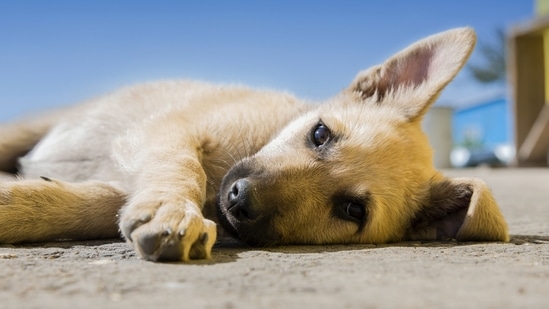Signs of pneumonia in dogs and how to treat them - Hindustan Times
Fever, runny nose, coughing, wheezing, difficult breathing, a decreased appetite, fatigue, and weight loss are some of the typical symptoms of pneumonia in dogs.

Pneumonia is an inflammation of the air sacs of the lungs and can cause difficulty in breathing and coughing. The pulmonary condition can also affect dogs, cats and other animals apart from humans. Pneumonia in dogs can be easily treated if detected early and with proper treatment. There are different types of pneumonia that can affect your canine companion. Viral or bacterial pneumonia is most common while breathing in foreign material can cause aspiration pneumonia. It can also be contracted by inhaling spores. (Also read: Dogs can get dementia. Here's how to lower the risk)
"Aspiration pneumonia, bacterial or viral infections in the respiratory system, breathing in foreign objects, inhaling fungus spores, and other conditions are only a few of the causes of pneumonia in dogs," says Dr. Vinod Sharma, Head of Veterinary Services at DCC Animal Hospital.
SYMPTOMS OF PNEUMONIA IN DOGS
A fever, runny nose, coughing, wheezing, or quick and difficult breathing, a decreased appetite, an elevated body temperature, fatigue, and weight loss are some of the most typical symptoms of pneumonia in dogs, says Dr Sharma.
"It can also result in problems including pleurisy, an inflammation of the lining of the lungs, and increased susceptibility to other infections, if left untreated," he adds.
However, it is crucial to emphasize here that dog owners should never give their canine pets any over-the-counter medications because they might be highly hazardous and even fatal to them. Hence, if a dog appears to have pneumonia, the issue should not be ignored, and a consultation with an experienced veterinarian should be sought as soon as possible.
TREATMENT FOR PNEUMONIA IN DOGS
"The veterinarian may initially conduct blood tests and x-rays before prescribing the appropriate
course of action for the dog. Once a correct and thorough diagnosis has been made, the veterinarian may also recommend medication or, in more serious circumstances, hospitalisation.
The veterinarian will also provide instructions on how to care for the dog properly at home after the procedure is complete. Making sure they get enough rest and are drinking adequate fresh water to prevent dehydration are two of the most crucial things pet parents can do in such a situation," says Dr Sharma.
Follow more stories on Facebook & Twitter
Personalise your news feed. Follow trending topics



Comments
Post a Comment